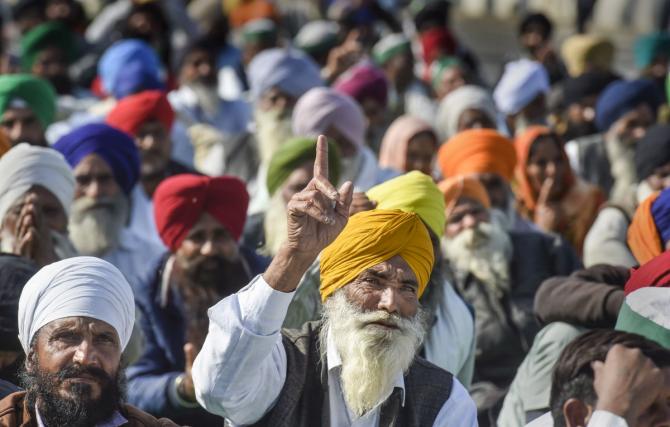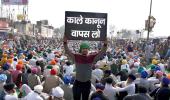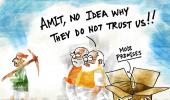If the protests have cemented the ties between the peasantry and the traders, the political implications for the BJP might become too serious to be disregarded because its core base was made up of the urban Khatri merchants, says Radhika Ramaseshan.

For the Bharatiya Janata Party, it is about making the best of a thankless situation in Punjab as the farmers' protests show no sign of resolution.
It lost an old ally, the Shiromani Akali Dal, and is friendless in Punjab.
"All is not gone for us. We have consolidated our votes in the business and trading communities because nobody else is speaking for them.
"The 'kisan andolan' is the last straw for a businessman who was affected by the chief minister's (CM's) failure to fulfil pre-poll promises," claimed Tarun Chugh, BJP's general secretary.
However, recent occurrences in Punjab belied Chugh's assertion.
In October 2020, Ludhiana traders adopted a sexist protest mode and sent bangles and anklets to Chugh and Ashwani Sharma, the state BJP president, for their alleged failure to intervene with the railway ministry and restart goods trains to and from the state after the protesting farmers vacated the tracks on which they had squatted when the movement against the three contentious farm laws, passed by the Centre, started.
The business community accused the BJP leaders of driving a divide between the farmers and traders.
Shortly thereafter, Malwinder Singh Kang, Punjab BJP's general secretary, quit the party to underline the 'solidarity' among the farmers, the 'arhtiyas' (or commission agents who form the pivot on which the markets and the producers rotate), small traders, and labour unions.
When Raghubar Das, the former Jharkhand CM and BJP's national vice-president, wrote an article stating that the farm legislations had 'ushered in freedom for farmers from the trap of middlemen', his remark provoked outrage among the traders of Punjab and outside.
Prodded by its Punjab representatives, the Confederation of All India Traders (CAIT) responded saying, 'Das's most irresponsible words have demeaned and infuriated India's trading community', and demanded action against him.
Indeed, if the protests have cemented the ties between the peasantry and the traders, the political implications for the BJP might become too serious to be disregarded because its core base was made up of the urban Khatri merchants.
The Panthic Sikhs never took to the BJP. The Jat Sikh peasants were largely with the SAD, while the Congress reconciled the two competing identities.
The end of terrorism and the pact between the BJP and the SAD mitigated the hostility between the Hindu and Sikh voters and blurred the rural-urban divide.
The BJP had a mixed view over the SAD split.
"We put up with the Akali’s high-handedness for decades to the extent that in 2016, when the BJP wanted to have a 'yatra' against rampant drug use, the high command said no because it didn't want to antagonise the SAD before the (2017) elections.
"The Akalis gave us the opportunity for a break-up. If they didn't break, the Sikhs would have deserted them," a BJP source said.
The source, a national leader familiar with Punjab politics, qualified his postulation with the admission that the BJP and the Centre had not bargained for the 'challenge' from the farmers.
"We are getting damaged in the north. The Sikhs have this unique capacity to work 24x7 and withstand adversities. Even the RSS (Rashtriya Swayamsevak Sangh) with its networks cannot work like the Sikhs.
"Our government should have brought the Bills after holding extensive consultations with the stakeholders," he said.
Sharma, the Punjab BJP chief, said the government/party's messages to the farmers were being disseminated through the social media and handbills.
"We have a well-oiled organisation. Person-to-person, door-to-door, we know how to reach people," he emphasised.
Dushyant Kumar Gautam, BJP general secretary and the national Punjab minder, said the central point in the BJP's counter-campaign was exposing the Opposition's 'double-speak'.
"Amarinder Singh (Punjab CM) introduced contract farming in 2002 to break free from the paddy-wheat cycle (it was scrapped in 2012), the SAD 'supported' contract farming and Sharad Pawar advocated contract farming as the Union agriculture minister.
"The Opposition says the Centre is only with the Ambanis and Adanis. Were Ambani and Adani going around with begging bowls before 2014, when the Congress was in power? Didn't Pawar and Amarinder dine with these industrialists?" asked Gautam.
Notwithstanding the outward bravado, sources conceded that while the BJP could live with the long-drawn 2019 dissent against the citizenship laws, the farmers' protests were 'another ball game' because the epicentre was a border state.
"The Congress wants to revive terrorism in Punjab. The Akalis will use the terrorism bogey to keep their base intact.
"We have to be cautious. Despite the attacks on our leaders, the sloganeering against the prime minister and the display of black flags, we are restrained because we don’t want to take Punjab back to the '80s," a central BJP functionary said.
On January 5, Surjit Kumar Jyani, a former Punjab minister who chaired the BJP's kisan coordination committee set up to interact with Punjab farmers before the laws were enacted, and Harjit Singh Grewal, another panel member, discussed the imbroglio for nearly two hours with PM Narendra Modi.
Jyani said, "The PM’s main concern was, who was the one individual from the 40-plus union leaders who can speak with the ministers and take the decisions."
Jyani and Grewal had no answers.











